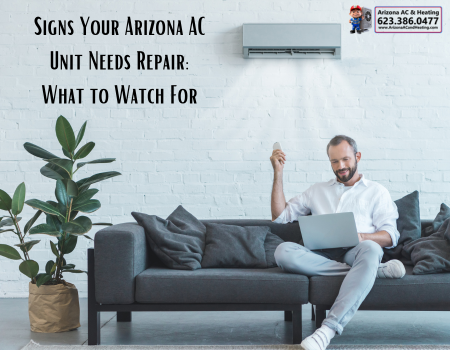As the temperatures soar in Arizona, your air conditioning (AC) unit becomes essential for comfort. When it starts to malfunction, the consequences can be both uncomfortable and costly. Recognizing the early warning signs of an AC unit in need of repair can save you from an unexpected breakdown and potentially expensive repairs. Here are some key signs to watch for, ensuring that your AC unit stays in top shape through the hot Arizona summer.
 1. Warm Air Blowing from Vents
1. Warm Air Blowing from Vents
One of the most obvious signs that your AC unit might need repair is if it starts blowing warm air instead of cool air. This could be caused by several issues, including a refrigerant leak, a malfunctioning compressor, or a broken thermostat. If your AC is working, but the air feels warmer than usual, it’s time to call a professional for an inspection. A technician will be able to determine the cause of the issue and restore your unit to full functionality.
2. Strange Noises Coming from the Unit
Unusual noises coming from your AC unit are often a sign of underlying problems. If you hear banging, grinding, or squealing sounds, it’s essential to have the unit checked as soon as possible. These noises could indicate a loose or broken part, such as a fan or motor, or even debris lodged in the system.Disregarding these noises can result in more extensive damage and increased repair expenses. A technician can diagnose the issue and replace any worn-out or broken components to ensure smooth operation.
3. Poor Airflow
If your AC unit is not blowing air as forcefully as it once did, there may be an issue with the airflow. This can be caused by a clogged filter, blocked ducts, or a problem with the fan or blower. Restricted airflow forces the unit to work harder, consuming more energy and reducing efficiency. If you’ve already replaced the air filter recently and the problem persists, it’s advisable to have an HVAC technician inspect the system to address the root cause of the airflow issue.
4. High Humidity Inside the Home
One of the primary functions of an AC unit is not just to cool the air but also to dehumidify it. If you start noticing that the air in your home feels more humid than usual, your AC might not be performing its full function. This could be due to a variety of reasons, such as a malfunctioning evaporator coil or a refrigerant leak. High humidity can make your home feel uncomfortable and lead to mold growth, so it’s important to address this issue promptly.
5. Frequent Cycling or Short-Cycling
AC units are designed to cycle on and off to maintain a comfortable temperature. However, if your AC is frequently turning on and off without reaching the desired temperature, this is known as short-cycling. This can be caused by an oversized AC unit, a malfunctioning thermostat, a refrigerant leak, or electrical issues. Short-cycling puts additional strain on the unit, leading to increased wear and tear and higher energy bills. If you notice this issue, contact an HVAC professional to diagnose and correct the problem.
6. Foul Odors Coming from Vents
If your AC unit emits unpleasant odors, it could indicate the presence of mold or mildew inside the ducts or around the evaporator coils. A musty smell suggests a buildup of moisture, which can create ideal conditions for mold growth. Additionally, burning smells could be a sign of an electrical issue or overheating components. In either case, it’s essential to have your AC unit professionally inspected and cleaned to prevent health hazards and ensure safe operation.
7. Increase in Energy Bills
A sudden spike in your energy bills without a corresponding increase in usage could be a sign that your AC unit is not functioning efficiently. Inefficiency can occur due to dirty coils, low refrigerant levels, or a worn-out compressor. When your AC unit struggles to cool your home, it works harder, using more energy in the process. Regular maintenance and timely repairs can help keep your unit running efficiently, saving you money on energy costs.
8. AC Unit Leaks Water
Water around your AC unit can indicate a problem with the condensate line or a frozen evaporator coil. The condensate line allows moisture to drain from the unit, and if it’s clogged, water can back up and leak inside or outside your home. If you notice pooling water around the base of the unit, it’s important to have it addressed immediately to avoid water damage to your property and further damage to the AC system.
Keeping an eye out for these common signs of AC trouble can help you catch problems early and prevent your system from breaking down during the hottest months of the year. If you notice any of these symptoms, don’t hesitate to call a professional HVAC technician. Regular maintenance and timely repairs can extend the life of your AC unit, ensuring that you stay cool and comfortable even during Arizona’s intense summer heat.

